WUSTL ENDURE Closing Symposium 2023
Click here to view the 2023 Program
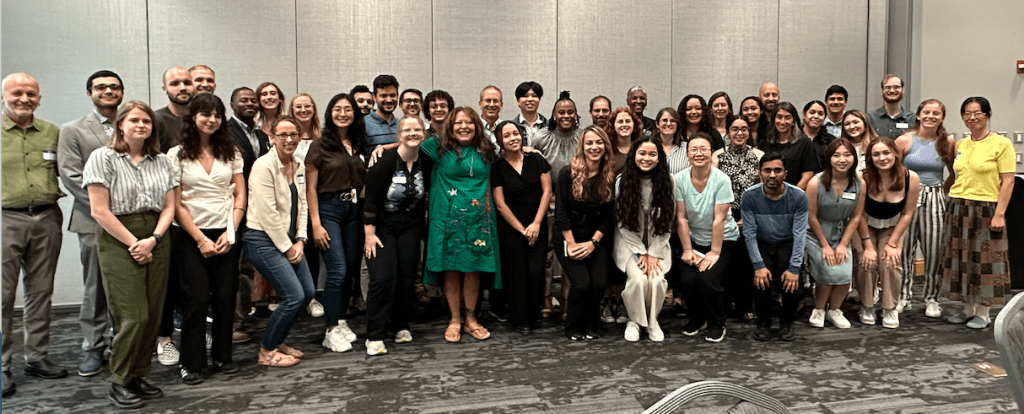

WUSTL ENDURE
Alumni Datablitz and Panel Discussions
Thursday, July 13, 2023
We did an experiment. We invited our alumni to a panel discussion with our current scholars. We also gave them the opportunity to present their research in our first ever Alumni Datablitz. It turned into a reunion. So much wisdom shared from experts who know how to navigate to and through the PhD and MD/PhD world. We were pleasantly surprised that both our alumni and current students thought this event was so worthwhile, that we should hold it every year. Below are a few photos from the event.
 ENDURE alum Sneha Chaturvedi.  ENDURE alum Ya’el Courtney.  ENDURE alum Ro Sandoval |
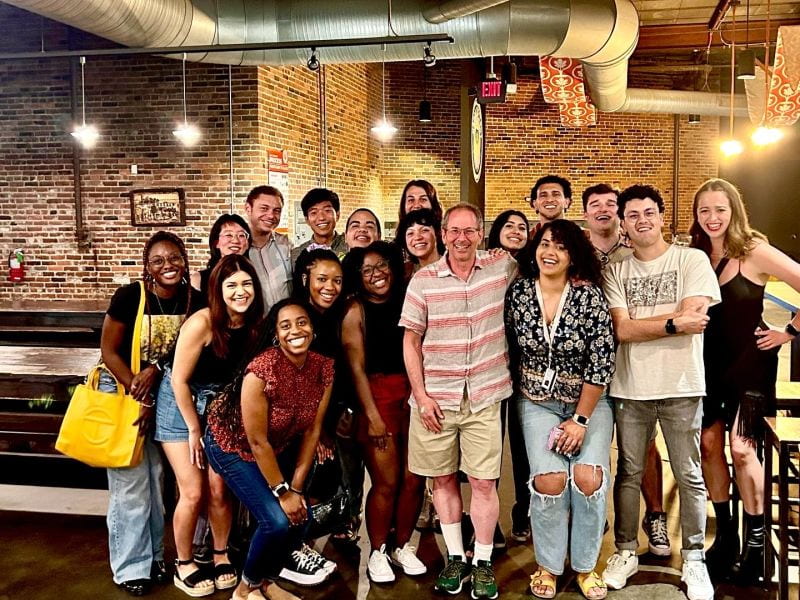


Herzog installed as the Viktor Hamburger Distinguished Professor
On Oct. 18, Erik Herzog, professor of biology, was installed as the Viktor Hamburger Distinguished Professor in Arts & Sciences. The program included welcoming remarks by Dean Feng Sheng Hu, the Lucille P. Markey Distinguished Professor; an introduction by Jonathan Losos, the William H. Danforth Distinguished University Professor; and the installation and medallion presentation by Provost and Executive Vice Chancellor Beverly R. Wendland. Click here for full story and YouTube Video.

ENDURE Scholar wins Goldwater Scholarship
Four students at Washington University in St. Louis have received the Barry Goldwater Scholarship, a prestigious award that honors students who conduct research in the natural sciences, mathematics and engineering.
The winners, all juniors, are:
- Neha Damaraju, who is studying biomedical engineering at the McKelvey School of Engineering. Damaraju plans to study genetics and precision medicine and serves as a research assistant in the DiAntonio lab at the School of Medicine.
- Sabrina Hu, who is studying chemistry and history in Arts & Sciences, Hu plans to develop technologies to create renewable energy sources and is a researcher in the Tolman Group laboratory in the Department of Chemistry. She also serves as the carbon neutrality intern in the Office of Sustainability.
- Ephraim Oyetunji, who is studying biology, the neuroscience track, in Arts & Sciences. Oyetunji plans to conduct translational research on neurodegenerative diseases such as Alzheimer’s disease, Parkinson’s disease and frontotemporal dementia and works in the Miller lab at the School of Medicine. Click here for full story.
Daylight saving time year-round would make our lives worse, Wash U expert says
St. Louis Public Radio | By Jane Mather-GlassPublished March 24, 2022 at 3:00 PM

The U.S. Senate passed a bill last week that would make daylight saving time permanent. If it gains full congressional approval, the change would take place in fall 2023 and would keep evenings lighter year-round, eliminating the seasonal adjustments of springing forward and falling back to move in and out of standard time.
Many rejoiced. Others pointed out that a two-year shift to daylight saving time was attempted in the 1970s but quickly repealed. The scientific consensus is that standard time — which most of the nation currently observes from November through March — is actually better for our health and circadian rhythms. Erik Herzog, a professor of biology and neuroscience at Washington University, told St. Louis on the Air that the effects of switching to daylight saving time are both immediate and long-lasting. Click here for full story.
St. Louis students compete at annual Brain Bee
Winner Varun Vasireddy to compete in national championship
About 50 high school students from across St. Louis region gathered virtually Feb. 27 to test their knowledge of the brain and to learn about neuroscience research and careers at the St. Louis Area Brain Bee, an annual event hosted by Washington University in St. Louis.
“We were thrilled to have such a diverse, motivated group of high school students join us to talk about brain science and give away some prizes,” said Erik Herzog, the Viktor Hamburger Distinguished Professor in Arts & Sciences, who helped organize the Brain Bee along with members of Synapse, the university’s neuroscience student group. Click here for full story.
Erik Herzog, the Viktor Hamburger Distinguished Professor in Arts & Sciences, received a $1,500 grant from the Dana Foundation in support of the 2022 Brain Awareness Week program, “St. Louis Area Brain Bee: Brain Explorers Camp.”
AAAS names eight Washington University faculty as 2021 fellows
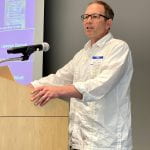
January 26, 2022
Eight faculty members at Washington University in St. Louis are among 564 new fellows selected by the American Association for the Advancement of Science (AAAS), the world’s largest general scientific society and publisher of the Science family of journals.
Arts & Sciences’ Leonard Green, Elizabeth S. Haswell, Sophia E. Hayes, Erik Herzog, Mark A. McDaniel, Jay W. Ponder and Crickette Sanz and the School of Medicine’s Pamela K. Woodard will join the newest class of AAAS Fellows, among the most distinct honors within the scientific community. Click here for full story.
‘I’m not devastated’: Biomedical student becomes first considered for prestigious scholarship
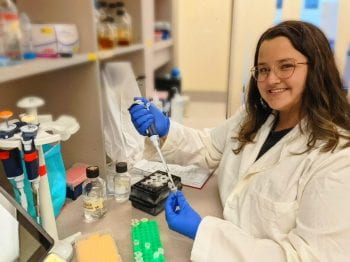
December 9, 2021
While Devin Burris didn’t always see herself living seven hours away from her family to attend UCF, a recent opportunity would have stretched that distance across the Atlantic Ocean.
The senior biomedical sciences major was the first UCF student invited to interview for the Marshall Scholarship, a postgraduate scholarship that fully funds up to 50 American students for graduate school in the United Kingdom. The news came much to the delight of her family and her mentors at UCF. Although she did not get the scholarship, she said she still plans to move forward in the U.S. with her goals to research gene therapy — and her family is still immensely proud. Click here for full story.
December 10, 2021
ENDURE scholar Ephraim Oyetunji selected as Hope Center Scholar

As an undergraduate student at Washington University, Ephraim focuses on neurobiology, African and African American studies, and religious studies. He aspires to be a physician who employs translational research to combat neurological disorders at the bench and in the clinic. As a Hope Center Scholar, Ephraim is in the Christopher Wells Hobler Lab led by Timothy Miller (WashU Neurology), and studies how antisense oligonucleotides can be used to learn more about how the nervous system’s immune response can influence pathological protein buildup.
The Hope Center Scholar program aims to identify promising undergraduate students who are interested in research on neurological disorders, providing financial support for their research and professional development. The Center is pleased to partner with the NIH-funded Maximizing Access to Research Careers (MARC) uSTAR program at Washington University, a minority-focused undergraduate training program that seeks to increase diversity in PhD and MD-PhD programs nationwide by supporting students in their junior and senior years. Special thanks to Jim Skeath for connecting the Hope Center with the MARC uSTAR program. For inquiries about the Hope Center Scholar Program, please contact the Hope Center.
Researchers in Arts & Sciences recently received awards from the National Institutes of Health, NASA, and the National Science Foundation.
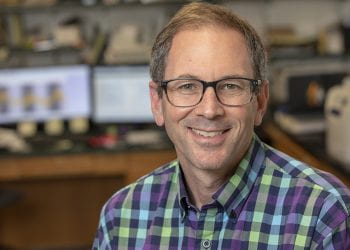
December 8, 2021
Erik Herzog, the Viktor Hamburger Distinguished Professor in the Department of Biology, was awarded a five-year $1,977,255 grant from the National Institutes of Health’s National Institute of Neurological Disorders and Stroke. The award supports Herzog’s project titled “Circadian Regulation of Neocortex.”
Brain trust: Symposium brings together diverse community of undergraduate neuroscientists
By Shawn Ballard 8.19.21 | NATURAL SCIENCES & MATH
The WUSTL ENDURE program, which hosts the annual symposium, partners with groups across WashU and local institutions to attract top talent, provide training and mentorship opportunities, and improve the diversity of the neuroscience field.
“What would happen if you lost your heart?” Ephraim Oyetunji, a rising junior studying neuroscience in the Department of Biology and African and African American studies, both in Arts & Sciences, is not speaking romantically. “Every other piece of your body can be lost or transplanted, including your heart, but if you lose your brain, you lose yourself.” click here for full story.
Finding joy in the midst of sorrow: Lori Turner Corzine applies life lessons to her job and volunteer work
By Erin Gerrity8.2.21 | UNDERGRADUATE, OUTREACH
Lori Turner Corzine is the new Program Coordinator for the WUSTL ENDURE program.
She is originally from Hillsboro, MO and currently lives in Webster Groves. She’s worked in various roles at WashU from 1996 to 2010, mostly in Film and Media Studies, where she served as a one-person office while they started the program, followed by a position in the Sam Fox School. She always knew she would return to WashU, where she hopes to eventually complete a degree and learn as much as possible about neuroscience. She hopes to use the knowledge she gains to educate people about what happens in the brain when we experience grief. Click here for full story.